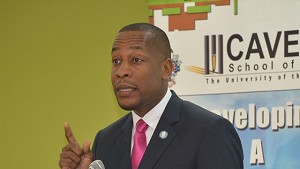 The Eastern Caribbean Central Bank (ECCB) is advising the government to institute a debt ceiling and a cap on state payroll to reduce its staggering 92 percent debt to gross domestic product (GDP) ratio the highest in the eastern Caribbean Currency Union (ECCU).
The Eastern Caribbean Central Bank (ECCB) is advising the government to institute a debt ceiling and a cap on state payroll to reduce its staggering 92 percent debt to gross domestic product (GDP) ratio the highest in the eastern Caribbean Currency Union (ECCU).
During a recent visit to the twin island state, Governor of the ECCB Timothy Antoine said he would encourage the government here to follow the lead of Grenada and Anguilla in enacting “fiscal responsibility legislation.”
“A fiscal law basically makes governments live within their means… You first set a debt ceiling (and)… set a primary surplus,” he said, adding, “In the case of Antigua & Barbuda it’s at 92.1 per cent, therefore you have to work assiduously to get down to the target.”
Antoine wants all ECCU states to achieve a debt to GDP ratio of 60 per cent by 2030. “It is extremely important that Antigua & Barbuda sets interim targets… We encourage them to set a target for 2020 and 2025,” he said. Prime Minister, and Minister of Finance, Gaston Browne said that though a 60 per cent aim for 2030 was “desirable,” the government’s aim may ultimately be higher.
“I believe we can do it. But, in any event, we may not necessarily desire to be at 60 per cent. It could be 65 or 70 per cent. It all depends on whether or not we can service loans at 65 or 70 and still have reasonable development,” he said.
On the possibility of enacting fiscal responsibility legislation, Browne said, “It’s something we’ll look at, at some point, but as it stands now, we’re running a very disciplined ship,” he said, adding “We have had one of the strongest primary surpluses for the last 22 months compared to others in the region.”
